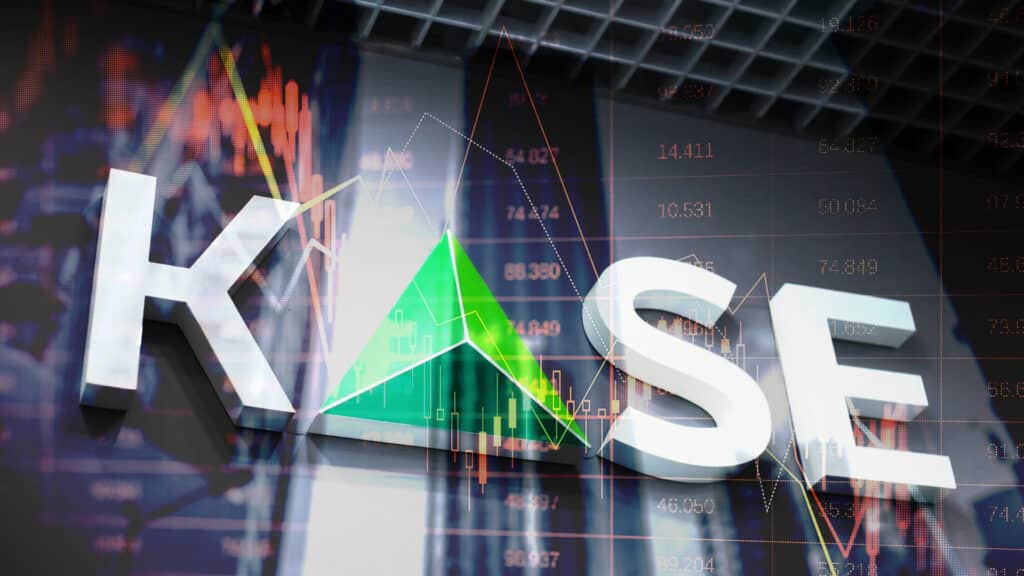
The volume of stocks traded on the Kazakhstan Stock Exchange (KASE) declined by more than one-third to approximately $37.4 million in January. Last month, trading in this sector mostly occurred on the secondary market, the exchange said in a statement.
The aggregated trading volume on KASE has shrunk by 11.9% to around $57 billion. However, the KASE Index increased by 1.2% month-on-month (MoM), reaching 5,644.41 points. Currently, the figure stands at 5,628.52 points, indicating a slight decrease.
Stock market
Stock market capitalization saw a 2.4% decline to $63.9 billion. The daily average stock trade on KASE totaled roughly $1.87 million. The number of transactions reached approximately 12,500 per day with an average volume per transaction standing at $150. More than half of investors (55.7%) were private entities. The share of foreign investors reached 5.7%.
Index stocks trading rose by 12.1% to around $34.8 million in January, with the stocks of Kazakhtelecom, the largest telecommunication company in Kazakhstan, accounting for nearly 19% or $6.5 million of the trade. The highest trade volume occurred in the company’s common stocks. However, over the last month, it declined by approximately $2.4 million.
Among the index stocks, the highest price increases were reported for the securities issued by Bank CenterCredit (22.5%) and Kazakhtelecom (7.4%). Notably, the latter finalized the sale of the Tele2/Altel mobile operator to Power International Holding from Qatar. The share price of KazMunayGas and Air Astana reported the most significant drop, falling by 5.3% and 5%, respectively.
Kaspi.kz securities fell in price by 4.7% MoM. Meanwhile, Halyk Bank’s securities rose by 1%. In January, Kaspi.kz reported the completion of its acquisition of a controlling stake in Hepsiburada, the third-biggest marketplace in Turkey.
In the KASE Global sector, trade volume dropped by 41.5% to roughly $15 million, with the average daily trade volume standing at $749,000 and the average amount per transaction at $771.65. The average number of transactions reached 970 per day.
The majority of transactions involved stocks of ProShares Bitcoin Strategy ETF (over 4,000 transactions totaling $2.6 million), Nvidia (3,800 transactions totaling $2.8 million) and Intel (1,500 transactions totaling $617,720). Slightly more than half of investors (50.9%) were private entities, while the share of foreign investors reached 2.8%.
Bond and government securities markets
Bond trading on KASE plummeted by 83% MoM to $201 million. The average daily trading volume reached roughly $10 million ($5.6 million in the aftermarket), with 530 transactions and an average volume of $18,917 per transaction.
Corporate debt in circulation reached $631.6 million, marking a 2.3% increase MoM. In late January, KASE listed debt securities from 125 issuers through 512 offerings. Last month, the exchange’s list was updated with 10 new issues, while nine were excluded. The KASE_BMY index indicating corporate bond yield grew by six basis points to 13.91% per annum.
The value of government debt traded on KASE reached approximately $53.7 billion, rising by 0.2% compared to December. The total trading volume of government securities amounted to $1.1 billion, 2.5 times higher than the previous month. The average daily trading volume stood at $56.55 million, while the average amount per transaction was $2.2 million. The average daily number of transactions reached 25.
Securities of investment funds rose by one-fourth, reaching approximately $1.5 million. As of Feb. 1, the sector included 17 open-end fund instruments managed by five companies, as well as six exchange-traded funds (ETFs). Among investors in this category, 54.1% were private entities.
Foreign exchange market
The foreign exchange trade volume declined by 14.9% MoM, reaching roughly $6.5 billion. About 800 transactions were made daily, with an average volume per transaction of $415,778. In January, 35 KASE members participated in the foreign exchange market.
The U.S. dollar–tenge pair accounted for the largest share of foreign currency transactions, totaling 74.4% of the total volume. Its trade volume reached $4.7 billion, marking a 16% decline MoM. Another significant share (18.6%) was held by the Russian ruble–tenge pair, which fell by 16.5% to $1.3 billion.
The most significant increase in trade was observed in the euro–tenge pair, rising by 30.8% to €93.7 million MoM. Meanwhile, the euro–dollar pair saw a sharp decline, falling by 27.7% to €85 million.













